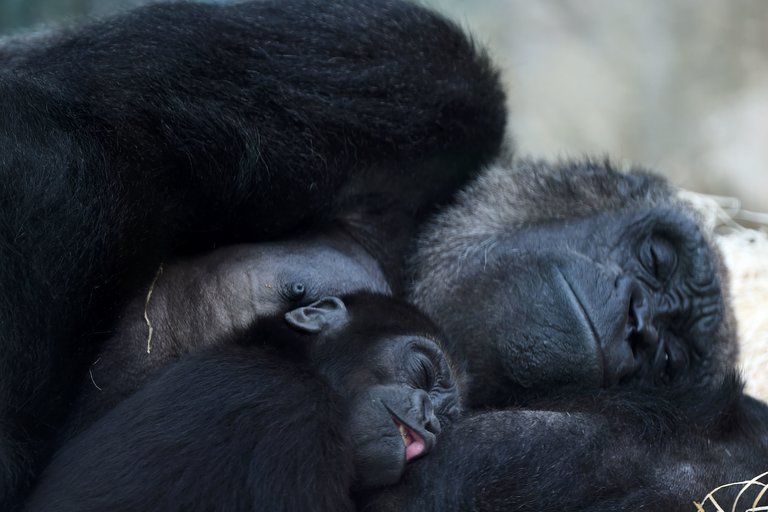 |
| A young gorilla sleeps with its mother inside their enclosure at the Zooparc de Beauval in Saint-Aignan, central France, on April 14, 2017. |
In one instance, he was studying the sleep of the troop's alpha male, Azy. The big orangutan was in a deep REM (rapid eye movement) sleep, the state most often associated with dreaming.
Samson told Seeker that, in a flash, Azy "quickly arose from his slumber and began storming through the enclosure performing a spectacular 'long-call' that woke all of the other orangutans up. It's total speculation, but I intuit that he had a bad orangutan dream and wanted to let everybody know about it!"
All primates appear to dream, but each species exhibits its own unique sleeping characteristics and durations, with humans having perhaps the most unusual sleep of any such animal. The findings, reported in the American Journal of Physical Anthropology, include the observation that humans sleep far less than other studied primates.
"It is truly surprising that the largest brained primate sleeps the least," Charles Nunn, who co-authored the paper with Samson, told Seeker.
Nunn, also a Duke University anthropologist, and Samson gathered data on 30 primates: the duration of their sleep and the time each species spends in REM, as well as in dreamless NREM sleep.
In general, nocturnal primates were found to sleep more than those that are active during the day (diurnal). The appropriately named three-striped night monkey, a night-prowling owl monkey from Venezuela and Brazil, sleeps an average of about 17 hours every day.
Diurnal chimpanzees, in contrast, sleep about 9.67–11.5 hours a day. The common marmoset, common squirrel monkey, Hamadryas baboon, and Guinea baboon all sleep about that duration. The gray mouse lemur, cotton-top tamarin, barbary macaque, ring-tailed lemur, gelada monkey, and rhesus macaque sleep more — sometimes over 15 hours a day.
Based on human evolutionary history, the scientists predicted that members of our species should sleep 9.55 hours per day. Few people, however sleep that much.
"It appears that we are not a typical primate, since very few adults would sleep that amount of time on average," Nunn said.
Instead, meta-analyses in the West and anthropological studies of traditional small-scale societies, such as hunter-gatherer populations, show that humans on average sleep for 7 hours a day.
At first the researchers suspected that exposure to artificial light from devices like street lamps and computer screens might be keeping us awake longer. In an earlier study, however, they found that hunter-gatherers without electricity in Tanzania, Namibia, and Bolivia actually get less shut-eye than those of us with electronic gadgets.
The authors theorize that when our primate ancestors transitioned from an arboreal to a terrestrial lifestyle, they faced greater threats.
"In a terrestrial environment, there is more predation risk and more risk from hostile conspecifics; both should lead to less sleep," Nunn explained.
Humans learned how to control fire, though, which likely allowed early humans to sleep near fire in order to ward off predators. That could help to explain why many of us find being near a controlled fire — such as a campfire or fireplace — comforting.
Humans also began to sleep in groups. As people age, they tend to wake up more in the night. This makes getting a sound sleep challenging, but in earlier times it would have been a lifesaver for the individual as well as for anyone whom they might have roused if a predator or even threatening person might have approached.
Babies also wake up frequently, causing their parents and anyone else within earshot to stop sleeping as well. This could have also served as a protective measure for our ancestors, helping to safeguard the youngest and most vulnerable members of early human groups.
Sleeping less holds other benefits. As Nunn said, "In terms of opportunity costs, longer sleep would give less time for social learning, innovation, forming and maintaining alliances and more."
He added, "It appears that sleep has been whittling away since our last common ancestor with chimpanzees."
Samson suspects that australopithecines — members of a now-extinct genus of hominins — slept in trees for about the same duration as modern chimps do today. The human lineage thereafter probably evolved the shorter sleep times.
The researchers initially suspected that humans should spend 13.8 percent of their total sleep time in REM. They instead found that people on average are in REM for 22.3 percent. This is well above REM time for primates such as mouse lemurs, mongoose lemurs and African green monkeys, whose REM sleep barely climbs above 5 percent.
The three-striped night monkey, on the other hand, experiences more REM than humans, as does the crab-eating macaque, rhesus macaque, common marmoset, and common squirrel monkey. Since these primates all sleep far longer than humans, their percentage of NREM is consequently higher too.
"It is surprising that we cut into NREM sleep so heavily, given what is known about the importance of NREM sleep for health and cognition," Nunn said.
In a prior paper, Nunn and two other colleagues suggest that natural selection for shorter sleep time in humans has compromised the efficacy of physiological mechanisms that protect against Alzheimer's disease during sleep.
In particular, they note that the functional waste clearance pathway for the central nervous system — the glymphatic clearance pathway — drains interstitial fluid from the brain, removing extra-cellular amyloid beta peptides, which are the main component of Alzheimer disease plaques. This process, they report, happens twice as fast during sleep. Less sleep might therefore increase a person's chances of developing Alzheimer's.
Read more at Seeker
No comments:
Post a Comment